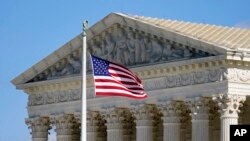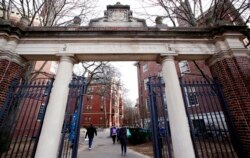The Supreme Court this week announced that it would hear two cases challenging the practice by some U.S. universities of using the race of an applicant as one of the factors that affect admissions.
The announcement, six years after the court upheld the use of affirmative action in a case involving the University of Texas at Austin, is another signal that the high court's new conservative majority is willing to wade into thorny issues on the fault lines of U.S. politics.
The court said it would combine two cases — one brought against Harvard University and another against the University of North Carolina. The central question identified by the court in both cases is whether it should overturn its own ruling from 2003 in the case Grutter v. Bollinger, which the court upheld in 2016, that allowed universities to use race as a factor in admissions decisions.
Both cases were brought by an organization called Students for Fair Admissions. In a statement, the group's president, Edward Blum, said, "In a multi-racial, multi-ethnic nation like ours, the college admissions bar cannot be raised for some races and ethnic groups but lowered for others. Our nation cannot remedy past discrimination and racial preferences with new discrimination and different racial preferences."
Blum's organization claims that Harvard and the University of North Carolina effectively discriminate against Asian American and white students to the extent that they give any preference to members of other groups, notably African Americans, when making admissions decisions.
The Harvard case comes to the Supreme Court on appeal from the U.S. District Court for the District of Massachusetts, which found that the university's admissions system, while "not perfect," was not racially discriminatory.
'Merit' v. 'accidents of life'
Supporters of affirmative action point out that many of the factors typically considered "merit" by advocates of completely race-blind admissions cannot be reliably disentangled from privilege. Do students who achieve excellent grades and test scores with the aid of college-educated parents, or of tutors hired by their parents, truly exhibit more merit than students who achieved slightly lower marks without any outside assistance?
"Those built-in advantages ought to not count as merit. Those aren't merit," said Michael A. Olivas, the William B. Bates Distinguished Chair in Law (Emeritus) at the University of Houston Law Center.
"Those are accidents of life," Olivas told VOA. "Children can take advantage of opportunities, but the opportunity structures are unequally distributed in our society, and higher education is probably the best manifestation of that."
The current college admission system may be imperfect, Olivas said. However, he added, "As (Former British Prime Minister Winston) Churchill once said of democracy, I think it's the worst of all systems, except for the alternatives. What would you substitute in the alternative?"
Multiple flashpoints
The court's decision to take on an affirmative action case creates another potential flashpoint in the so-called "culture wars" that dominate political discourse in the United States.
So far this term, the court has heard arguments in an abortion case that many experts believe will lead to the overturning or gutting of the 1973 Roe v. Wade decision, which determined that states are not allowed to outlaw access to abortion services
The court has also heard arguments in a controversial gun rights case, New York State Rifle & Pistol Association, Inc., v. Bruen, which could result in the invalidation of numerous state-level gun laws that restrict the ability of individuals to carry firearms outside of their homes.
Decisions in the abortion and gun rights cases are expected in the coming months. The affirmative action case will not be heard until the court's next term begins in October.
The court has already ruled on some controversial cases during its current term.
Earlier this month, it blocked the Biden administration’s effort to require all businesses with 100 or more employees to require workers to be vaccinated against the virus that causes COVID-19 or have a masking and testing policy.
Last August, the court required the Biden administration to reinstitute the controversial Remain in Mexico program initiated by the Trump administration, which required asylum-seekers stopped at the southern border to remain outside U.S. territory while their applications are processed.
Energized conservative majority
Because former President Donald Trump was able to appoint three new members to the court during his four years in office, the ideological makeup of the court shifted dramatically in a short time. The 5-4 conservative majority that existed during former President Barack Obama's final term in office often produced rulings friendly to the political left, when a centrist conservative crossed over to vote with the court's liberal bloc, including a landmark 2015 ruling legalizing same-sex marriage nationwide.
However, the court is now solidly conservative by a margin of 6-3.
"You have a very strong working majority of conservative voices in the court now," said Frederick M. Lawrence, a distinguished lecturer at Georgetown Law Center and the former president of Brandeis University. "By any objective measure, this is the most conservative court in the country in roughly a century."
Lawrence said it would not be unreasonable to expect the court to begin revisiting many decisions made by previous incarnations of the court which American conservatives have long opposed.
"There are at least some justices of that conservative group who have very strong views about what the law ought to be, what the court has done over the past quarter-century or half-century, and what they're trying to roll back," he told VOA.
While liberal groups brace for likely defeats, setbacks and reversals, conservatives are eager to continue advancing legal cases that could draw the high court's attention and, they hope, result in sweeping decisions favorable to their side.






